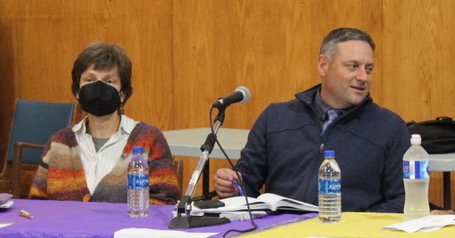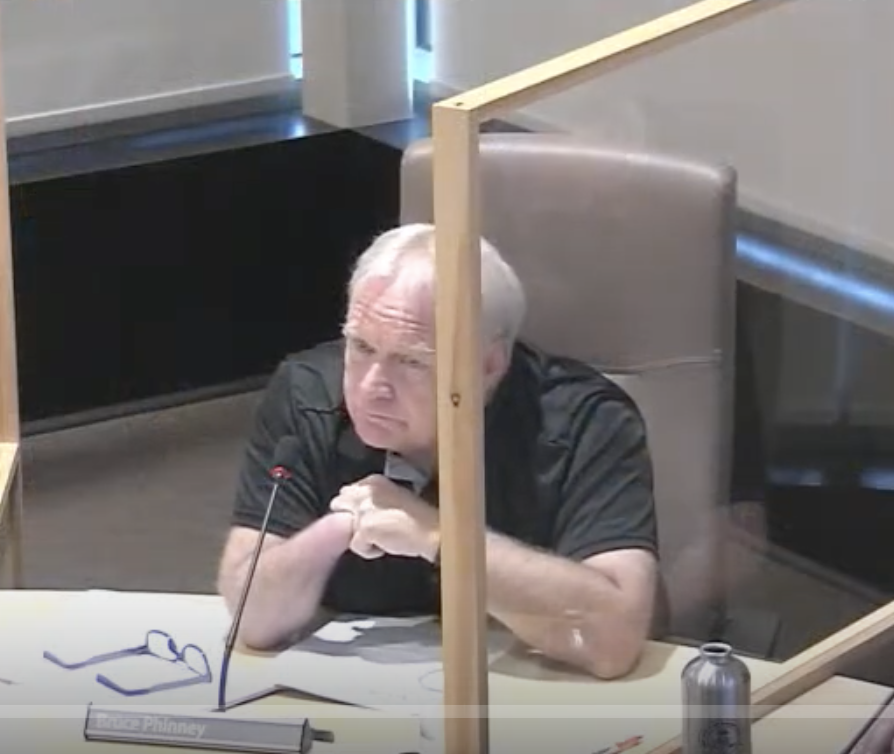Earlier this month, in one of its final votes ever, Sackville Town Council approved a project that will see electrical upgrades and the installation of an EV charger in its downtown parking lot between Goya’s Pizza and the post office. In the process, two candidates for a seat in the new town of Tantramar’s Ward 4 faced off with opposing views on the town’s EV infrastructure strategy.

This is actually the third time Sackville Town Council has approved the EV charger project. It first came up a year ago in budget deliberations when councillors agreed to set aside $108,000 for the project. Then this summer, council approved three motions that authorized staff to purchase the EV charger, to hire Tantramar Electric to do about $100,000 in upgrades, and to pursue funding to help pay for the project. At the time, three councillors voted against the project, Ken Hicks, Bruce Phinney, and Matt Estabrooks.
The project came back to council this month due to cost increases that came about in the six months it took to get outside grants approved. As treasurer Mike Beal explained to councillors, when the contractor, Tantramar Electric, took a fresh look at the parts cost for the project, they found significant increases. “We all know what inflation has done,” said Beal. “The contractor of course could not hold his price for the nearly six months it took [for grant approvals].”
Council ended up approving an extra $17,000 for the EV Charger project, but not before some councillors–and current Tantramar candidates–voiced their opinions both for and against.
Ward 4 candidate Matt Estabrooks voted against the project in June, and this time around chose to explain to councillors why he would do so again. Estabrooks’ comments centred around the issue of whether public funds should pay for the charger.
“The end result of this project will be Flo, a division of NB Power, operating and selling electricity to users via a charger that the town of Sackville purchased from them, which is supplied power through electrical infrastructure that the town of Sackville paid for,” said Estabrooks. “I struggle with, is that a proper use of taxpayers’ money at this point in time?”
Estabrooks also said that because the number of households owning electric vehicles in Sackville was still relatively small, he doubted many Sackvillians would make use of the charger, instead choosing to charge in their homes.
One new local EV owner, Lucas Morneau, says he plans to use the charger, as he doesn’t have access to his own charger at his home in a Sackville apartment, so has been making the trip to Aulac for fast charging needs.
Supporters have cited potential tourism benefits of the EV charger project, which they say will bring in EV users from the Transcanada Highway, as the charger appears on charge availability apps. But Estabrooks made the point that the report recommending the charger did not include any numbers or analysis quantifying the possible benefits, and that downtown Sackville’s Business Improvement Area did not initiate the proposal.
Estabrooks was also concerned that early investment in electric charging technology could backfire if the world goes in another direction. “I believe that alternatives to power our vehicles beyond fossil fuels must be found and supported,” said Estabrooks, “but that technology is changing very, very quickly.” Not only might chargers become obsolete, but alternative systems might pull ahead in the race to replace gas cars, said Estabrooks. “The potential exists for alternative environmentally friendly fuels to surpass battery electric options, ie hydrogen, within the next few years,” said Estabrooks. “And electric chargers could be a thing of the past.”

Councillor Bruce Phinney also chimed in to explain why he voted against paying the increased cost of the project, pointing out that with battery electric cars and infrastructure going down in cost, he felt now was the wrong time for Sackville to invest, suggesting instead that five years time would make more sense.
Councillor Sabine Dietz, who happens to be Matt Estabrooks’s only challenger for the Ward 4 seat in the new Tantramar council, responded to criticisms of the charger project with a different vision of where things were headed.
“This shows me that Councillor Estabrooks and Councillor Phinney do not quite follow world events around climate change, around where electrification of our transportation system is actually going,” said Dietz. “This is not a 10, 15, 20, 30 year issue. This is a very quick issue. This is happening within the next five years.”
Dietz mentioned the federal government’s strategy to convert to zero emission vehicles, including a mandatory target for all new light-duty cars and passenger trucks to be zero-emission by 2035. But she also acknowledged the high cost of EV chargers.
“Electrical vehicle infrastructure is very expensive,” said Dietz, “there’s no doubt about that. It makes me swallow as well. However, as individuals, as communities and as governments, there have to be leaders. And they have to be people out front to make it possible for others to follow suit,” said Dietz. “And this is one of those cases.”
“Transportation is one of our biggest contributors to greenhouse gases,” said Dietz, “and that is where a lot of the focus currently is… The electrification of our transportation system needs to happen. And electric vehicles are part of that equation.”
